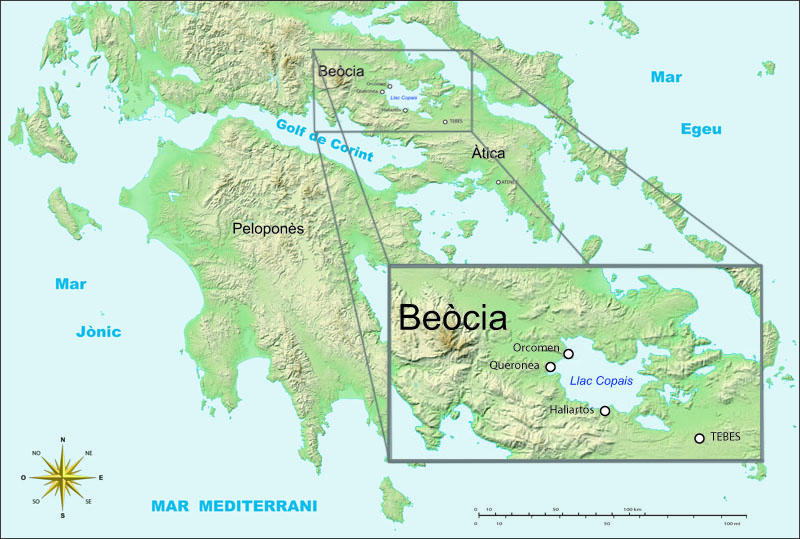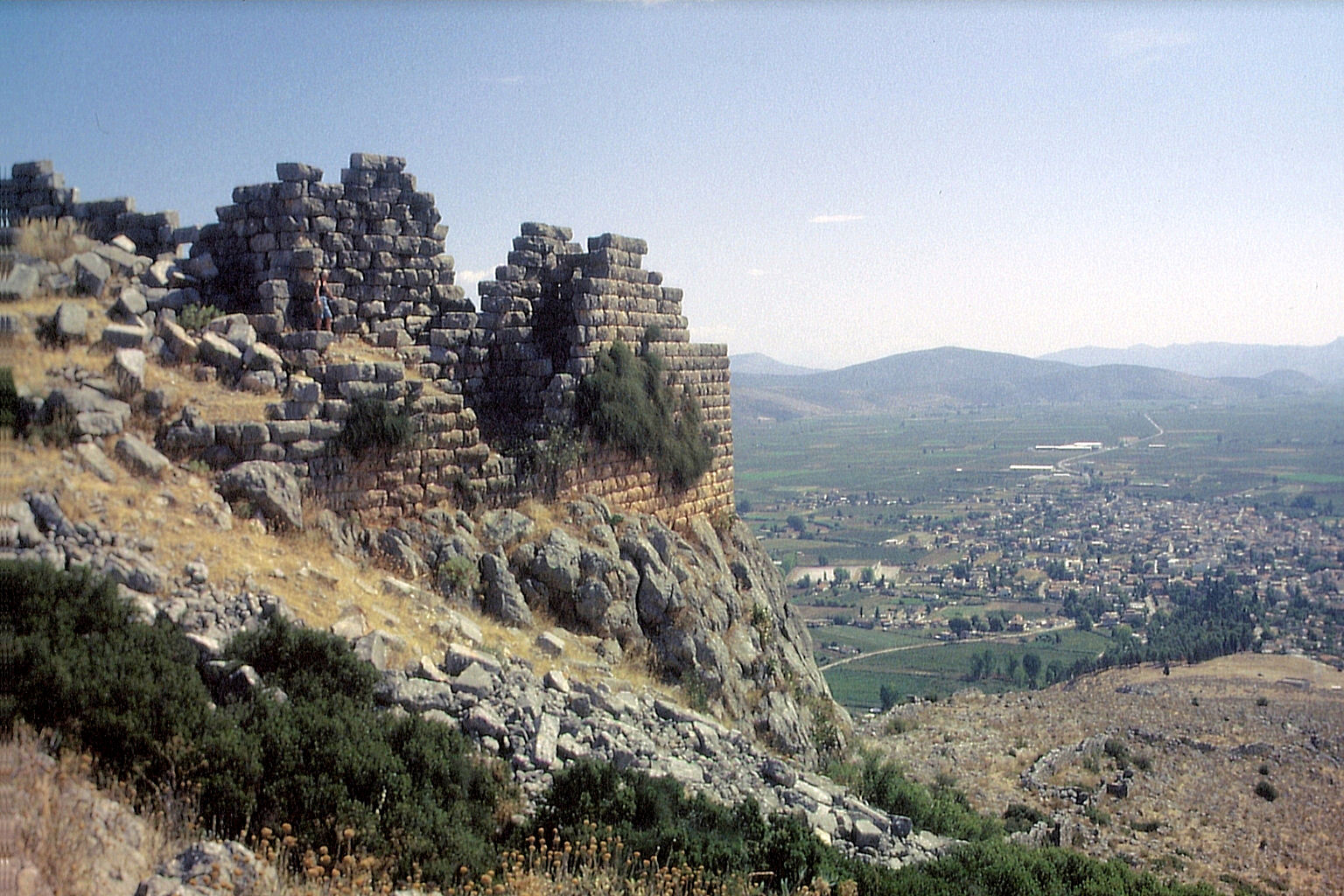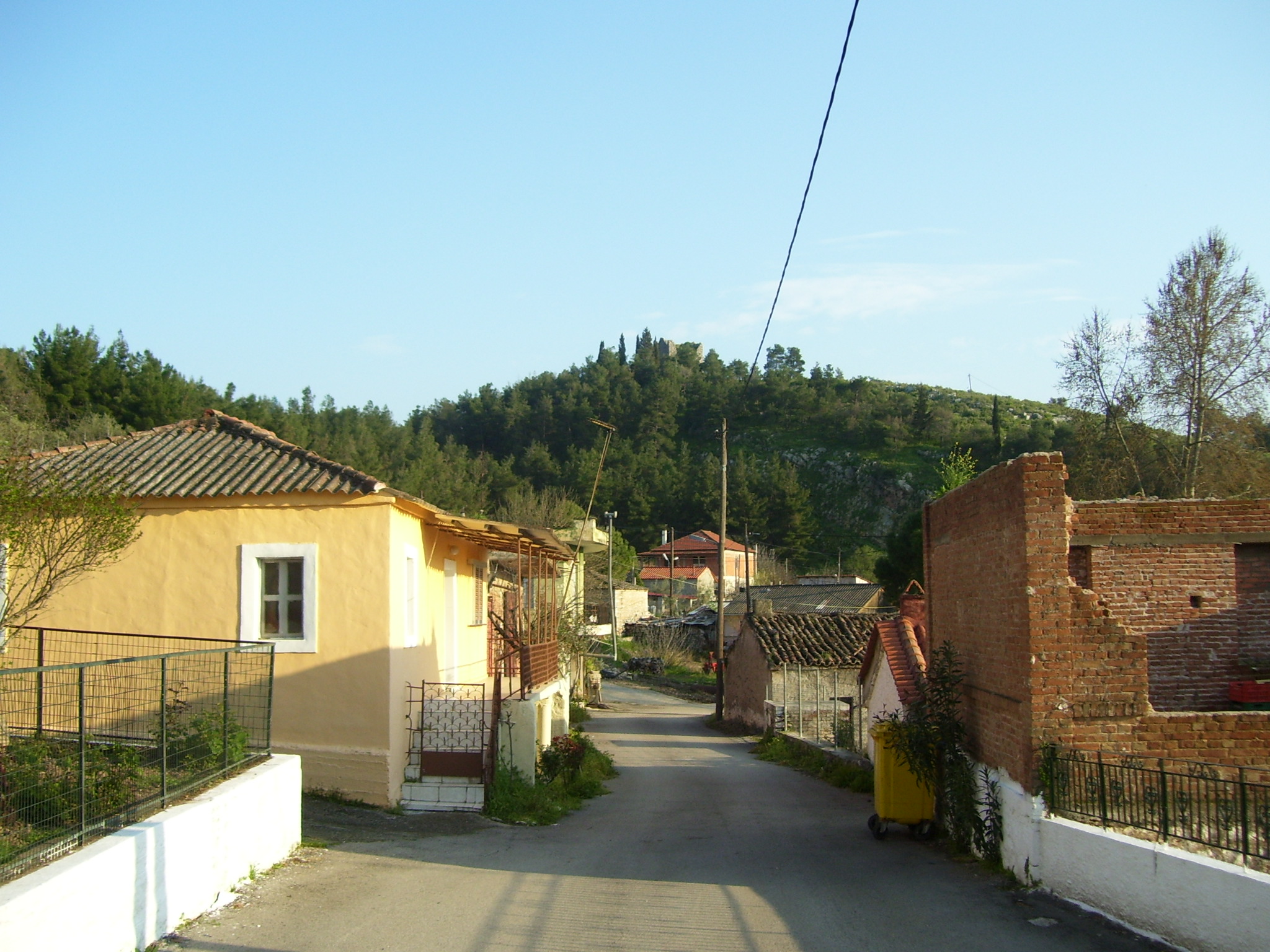|
Tegyra
Tegyra ( grc, Τεγύρα or Τέγυρα), also: Tegyrae ( grc, Τεγύραι, Tegyrai) was a town of ancient Boeotia, the site of an oracle and temple of Apollo, who was even said to have been born there. It was the site of the Battle of Tegyra in 375 BCE. It was located north of Lake Copais, above the marshes of the river Melas. Its location has been identified with sparse remains 5 km (3 mi) northeast of Orchomenus, a hill with springs at the base, the head of the Polygira tributary of the Melas. J.M. Fossey, however, placed Tegyra at modern Pyrgos, 7 km. further east, and thought the Polygira site was Homeric Aspledon.Farinetti, E., Boeotian Landscapes (2009), App. I.4.9 See also *Delos Mountain Delos or Delos Mountain was the ancient name of a mountain located in Boeotia, Greece, above the city of Tegyra. The mountain was sacred to Apollo, to whom temples on its slopes were dedicated. ReferencesHazlitt, Classical Gazetteer, "Delos"*Ri ... Attribution References ... [...More Info...] [...Related Items...] OR: [Wikipedia] [Google] [Baidu] |
Battle Of Tegyra
{{Campaignbox Greek wars of the 4th century BC The Battle of Tegyra (375 BC) (also known as the Battle of Tegyrae)Plutarch, ' was an ancient Greek battle between Theban and Spartan hoplite forces. In the battle, a Theban army under Pelopidas was challenged by a substantially larger Spartan force while retreating from an abortive attack on Orchomenus, but successfully attacked and routed the Spartans. The battle marked the first occasion in the historical record in which a Spartan force had been defeated by a numerically inferior enemy in a set battle (as opposed to irregular warfare, employed by Iphicrates). Prelude After an insurrection in 379/8 BC removed Spartan control over Thebes, the city set about reestablishing its control over the Boeotian League. Over several years of campaigning, the Thebans succeeded in driving Spartan garrisons out of every city in Boeotia but Orchomenus. In 376 BC, Pelopidas, learning that the Spartan garrison of Orchomenus had gone on an exped ... [...More Info...] [...Related Items...] OR: [Wikipedia] [Google] [Baidu] |
Apollo
Apollo, grc, Ἀπόλλωνος, Apóllōnos, label=genitive , ; , grc-dor, Ἀπέλλων, Apéllōn, ; grc, Ἀπείλων, Apeílōn, label=Arcadocypriot Greek, ; grc-aeo, Ἄπλουν, Áploun, la, Apollō, la, Apollinis, label=genitive, , ; , is one of the Olympian deities in classical Greek and Roman religion and Greek and Roman mythology. The national divinity of the Greeks, Apollo has been recognized as a god of archery, music and dance, truth and prophecy, healing and diseases, the Sun and light, poetry, and more. One of the most important and complex of the Greek gods, he is the son of Zeus and Leto, and the twin brother of Artemis, goddess of the hunt. Seen as the most beautiful god and the ideal of the ''kouros'' (ephebe, or a beardless, athletic youth), Apollo is considered to be the most Greek of all the gods. Apollo is known in Greek-influenced Etruscan mythology as ''Apulu''. As the patron deity of Delphi (''Apollo Pythios''), Apollo is an oracul ... [...More Info...] [...Related Items...] OR: [Wikipedia] [Google] [Baidu] |
Delos Mountain
Delos or Delos Mountain was the ancient name of a mountain located in Boeotia, Greece, above the city of Tegyra. The mountain was sacred to Apollo, to whom temples on its slopes were dedicated. ReferencesHazlitt, Classical Gazetteer, "Delos"*Richard Talbert, Barrington Atlas of the Greek and Roman World The ''Barrington Atlas of the Greek and Roman World'' is a large-format English language atlas of ancient Europe, Asia, and North Africa, edited by Richard Talbert, Richard J. A. Talbert. The time period depicted is roughly from Archaic Greece, ..., (), p. 55 Geography of ancient Boeotia Mountains of Greece Sacred mountains Apollo Mountains of Central Greece Landforms of Boeotia {{Greece-mountain-stub ... [...More Info...] [...Related Items...] OR: [Wikipedia] [Google] [Baidu] |
Ancient Boeotia
Boeotia ( ), sometimes Latinized as Boiotia or Beotia ( el, Βοιωτία; modern: ; ancient: ), formerly known as Cadmeis, is one of the regional units of Greece. It is part of the region of Central Greece. Its capital is Livadeia, and its largest city is Thebes. Boeotia was also a region of ancient Greece, from before the 6th century BC. Geography Boeotia lies to the north of the eastern part of the Gulf of Corinth. It also has a short coastline on the Gulf of Euboea. It bordered on Megaris (now West Attica) in the south, Attica in the southeast, Euboea in the northeast, Opuntian Locris (now part of Phthiotis) in the north and Phocis in the west. The main mountain ranges of Boeotia are Mount Parnassus in the west, Mount Helicon in the southwest, Cithaeron in the south and Parnitha in the east. Its longest river, the Cephissus, flows in the central part, where most of the low-lying areas of Boeotia are found. Lake Copais was a large lake in the center of Boeotia. It was ... [...More Info...] [...Related Items...] OR: [Wikipedia] [Google] [Baidu] |
Oracle
An oracle is a person or agency considered to provide wise and insightful counsel or prophetic predictions, most notably including precognition of the future, inspired by deities. As such, it is a form of divination. Description The word ''oracle'' comes from the Latin verb ''ōrāre'', "to speak" and properly refers to the priest or priestess uttering the prediction. In extended use, ''oracle'' may also refer to the ''site of the oracle'', and to the oracular utterances themselves, called ''khrēsmē'' 'tresme' (χρησμοί) in Greek. Oracles were thought to be portals through which the gods spoke directly to people. In this sense, they were different from seers (''manteis'', μάντεις) who interpreted signs sent by the gods through bird signs, animal entrails, and other various methods.Flower, Michael Attyah. ''The Seer in Ancient Greece.'' Berkeley: University of California Press, 2008. The most important oracles of Greek antiquity were Pythia (priestess to Apoll ... [...More Info...] [...Related Items...] OR: [Wikipedia] [Google] [Baidu] |
Lake Copais
Lake Copais, also spelled Kopais or Kopaida ( grc, Κωπαΐς; ell, Κωπαΐδα), was a lake in the centre of Boeotia, Greece, west of Thebes. It was drained in the late 19th century. It is now flat dry land and is still known as Kopaida. A one-time island in the lake was modified in ancient times into a megalithic citadel, now called Gla, though its ancient name is not known. It may be the city of Arne mentioned by Homer. Drainage When the lake existed, the towns of Haliartus, Orchomenus, and Chaeronea were on its shores. Rivers feeding the lake included the Cephissus, Termessus and Triton. The lake was (and is) surrounded by fertile land, but the lake increasingly encroached on the surrounding land because of inadequate drainage. In response to this, in 1867–1887 Scots and French engineers reclaimed the land for the British Lake Copais Company, by building channels to drain water from the lake to the Cephissus and from there to Lake Yliki (Ylíki Limní, ancient Hy ... [...More Info...] [...Related Items...] OR: [Wikipedia] [Google] [Baidu] |
Melas (Boeotia)
Melas may refer to: * Plural of mela People * Melas (mythology), a number of different characters in Greek mythology * Pavlos Melas (1870–1904), a Hellenic Army officer and a symbol of the Greek Struggle for Macedonia * Chloe Melas, an American journalist * Leon Melas (1812–1879), a Greek politician * Michael von Melas, a field marshal for the Austrian Empire during the Napoleonic Wars * Mihail Melas (1833–1897), a Greek politician and merchant * Vasileios Melas (1879–1956), an officer of the Hellenic army, brother of Pavlos Melas * Zafeiris Melas (born 1957), a Greek pop-folk singer Places * Melas, Kastoria, a village in Western Macedonia, Greece, formerly Statitsa, renamed for Pavlos Melas * Pavlos Melas (municipality), in Thessaloniki, Central Macedonia, Greece * Melas (Naxos), a town in ancient Greece * Melas, now Manavgat River, in Turkey * Melas Chasma, a canyon on Mars * Gulf of Melas, the previous name of Gulf of Saros, in Turkey Other uses * MELAS syndrome ... [...More Info...] [...Related Items...] OR: [Wikipedia] [Google] [Baidu] |
Orchomenus (Boeotia)
Orchomenus ( grc, Ὀρχομενός ''Orchomenos''), the setting for many early Greek myths, is best known today as a rich archaeological site in Boeotia, Greece, that was inhabited from the Neolithic through the Hellenistic periods. It is often referred to as " Minyan Orchomenus", to distinguish it from a later city of the same name in Arcadia. Ancient history According to the founding myth of Orchomenos, its royal dynasty was established by the Minyans, who had followed their eponymous leader Minyas from coastal Thessaly to settle the site. In the Bronze Age, during the fourteenth and thirteenth centuries BCE, Orchomenos became a rich and important centre of civilisation in Mycenaean Greece and a rival to Thebes. The palace with its frescoed walls and the great beehive tomb show the power of Orchomenos in Mycenaean Greece. A massive hydraulic undertaking drained the marshes of Lake Kopaïs, making it a rich agricultural area. Like many sites around the Aegean Sea, Orcho ... [...More Info...] [...Related Items...] OR: [Wikipedia] [Google] [Baidu] |
Pyrgos, Boeotia
Pyrgos ( el, Πύργος Βοιωτίας) is a small village in Boeotia, possible site of Homeric Nisa (''Iliad The ''Iliad'' (; grc, Ἰλιάς, Iliás, ; "a poem about Ilium") is one of two major ancient Greek epic poems attributed to Homer. It is one of the oldest extant works of literature still widely read by modern audiences. As with the ''Odysse ...'' 2.508). Reese, Steve. 2009. ''Homer's Winged Words''. Brill, pp. 172-180. It is named after a ruined medieval tower, with a notable Mycenaean element, that overlooks the village from a nearby hill. The hill is dedicated to Aiya Marina Pyrgos, or St. Marina of Pyrgos. The town forms part of the municipality of Orchomenos. Notes External links Populated places in Boeotia {{CGreece-geo-stub ... [...More Info...] [...Related Items...] OR: [Wikipedia] [Google] [Baidu] |
Aspledon
Aspledon ( grc, Ἀσπληδών), also called Spledon (Σπληδών), was a city of ancient Boeotia, mentioned by Homer in the Catalogue of Ships of the ''Iliad'', distant 20 stadia from Orchomenus. The river Melas flowed between the two cities. Strabo says that it was subsequently called Eudeielus or Eudeielos (Εὐδείελος), from its sunny situation; but Pausanias relates that it was abandoned in his time from a want of water. The town took its name from Aspledon, a son of Poseidon and the nymph Mideia In Greek mythology, Mideia or Midea (Ancient Greek: Μιδειη) may refer to: *Midea, a Phrygian slave, mother of Licymnius by Electryon. *Midea, a nymph, mother of Aspledon by Poseidon. The town Lebadea was believed to have previously been name .... Its site is near modern Pirgos. References Populated places in ancient Boeotia Former populated places in Greece Locations in the Iliad {{AncientBoeotia-geo-stub ... [...More Info...] [...Related Items...] OR: [Wikipedia] [Google] [Baidu] |
Populated Places In Ancient Boeotia
Population typically refers to the number of people in a single area, whether it be a city or town, region, country, continent, or the world. Governments typically quantify the size of the resident population within their jurisdiction using a census, a process of collecting, analysing, compiling, and publishing data regarding a population. Perspectives of various disciplines Social sciences In sociology and population geography, population refers to a group of human beings with some predefined criterion in common, such as location, race, ethnicity, nationality, or religion. Demography is a social science which entails the statistical study of populations. Ecology In ecology, a population is a group of organisms of the same species who inhabit the same particular geographical area and are capable of interbreeding. The area of a sexual population is the area where inter-breeding is possible between any pair within the area and more probable than cross-breeding with ind ... [...More Info...] [...Related Items...] OR: [Wikipedia] [Google] [Baidu] |
Classical Oracles
Classical may refer to: European antiquity *Classical antiquity, a period of history from roughly the 7th or 8th century B.C.E. to the 5th century C.E. centered on the Mediterranean Sea *Classical architecture, architecture derived from Greek and Roman architecture of classical antiquity *Classical mythology, the body of myths from the ancient Greeks and Romans *Classical tradition, the reception of classical Greco-Roman antiquity by later cultures * Classics, study of the language and culture of classical antiquity, particularly its literature *Classicism, a high regard for classical antiquity in the arts Music and arts *Classical ballet, the most formal of the ballet styles * Classical music, a variety of Western musical styles from the 9th century to the present * Classical guitar, a common type of acoustic guitar *Classical Hollywood cinema, a visual and sound style in the American film industry between 1927 and 1963 * Classical Indian dance, various codified art forms whose t ... [...More Info...] [...Related Items...] OR: [Wikipedia] [Google] [Baidu] |





